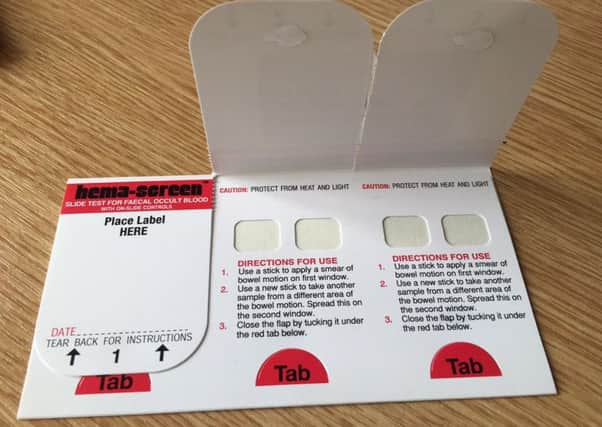Kevan Christie: Bowel cancer test procedure puts people off


Sadly, the 56.4 per cent uptake for the two-year reporting period from 1 November 2014 to 31 October 2016 carries within it a huge, and all too common, social and economic disparity between the areas of highest deprivation and the least deprived group.
The difference between a 43.4 per cent screening take-up in the poorest areas compared with 65.7 per cent in the richest gives weight to theories of medical illiteracy and a certain “fatalism” that is perceived to exist in some areas.
Advertisement
Hide AdAdvertisement
Hide AdEvery year in Scotland, there are around 3,800 cases of bowel cancer – around 2,100 cases in men and around 1,700 cases diagnosed in women. And around 1,600 people in Scotland die from the disease annually, according to recent figures.
Apologies, if you are reading this over your Cornflakes and morning copy of The Scotsman, but as the population ages we all need to be paying a bit more attention to our bowels. I believe plans are afoot to make the bowel screening test simpler and easier to use and this is to be welcomed.
I understand why providing three separate stool samples on little wooden sticks is not going to be at the top of anyone’s ‘to do’ list no matter whether you live in a bought or council house.
The current faecal occult blood test (FOBT) sent to everyone between the ages of 50-74 every two years in Scotland requires the recipient to takes samples from three different bowel motions and post them within 10 days of taking the first sample. It looks for hidden blood in samples and comes with an instruction leaflet - there’s also a short film about the test that you can watch online, if you have access to a computer.
Step 1 tells you to remove the label from the invitation letter with your name on it and stick it on to the test in the area marked ‘place label here’. Then take to the toilet your test, a pen to write the date, two of the cardboard sticks and something to collect your sample (toilet paper, a clean plastic bag or disposable container).
At this point, huge swathes of the Scottish adult population between the ages of 50-74, the ones who ‘never go to the doctor’, are shaking their heads as they put the test in the bin, chanting – ‘we’ve all got to die of something’.
If they do make it through to Step 2 there are chapter and verse instructions on how to collect your first stool sample with an emphasis on making sure your bowel motion does not touch the toilet water. Handy tips like folding pieces of toilet paper or putting your hand inside a small plastic bag abound - to help you navigate this minefield.
Then after various bits of information on using cardboard sticks to take a small sample ‘about the size of a pea’ there’s a sign-off warning you not to leave your test in a warm place or direct sunlight. Which seems kind of obvious.
Advertisement
Hide AdAdvertisement
Hide AdHowever, all joking aside, the test is not what anyone could describe as user-friendly, so it’s good news there are plans to replace it. The new Faecal Immunochemical Test (FIT) is due to be introduced in Scotland as a replacement to the current FOBT test later this year.
It has many advantages over the current procedure, is easier to use and can be measured more reliably by machine than the human eye. Crucially it needs just one tiny faecal sample from a single bowel motion compared to two samples from three different motions for FOBT. Hopefully, an easier test will go a long way to narrowing the deprivation gap and ultimately detecting cancer sooner.